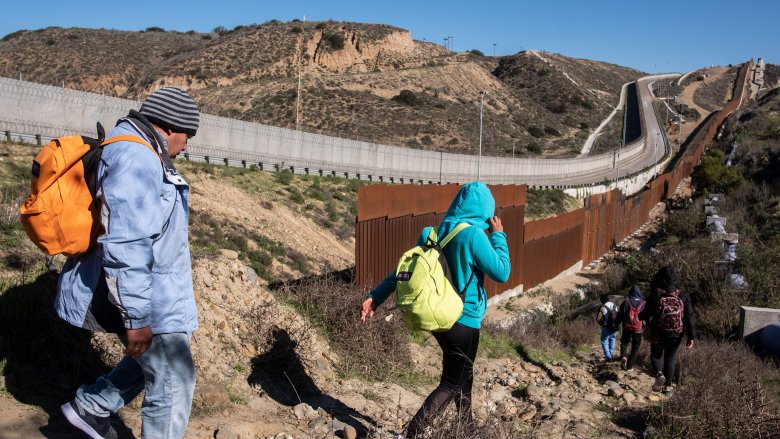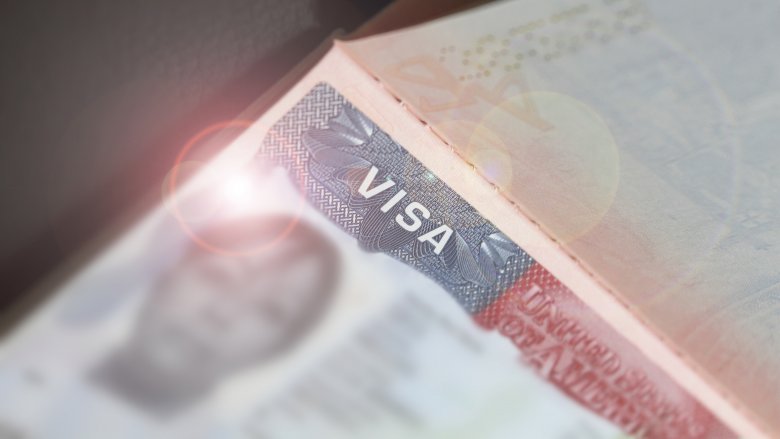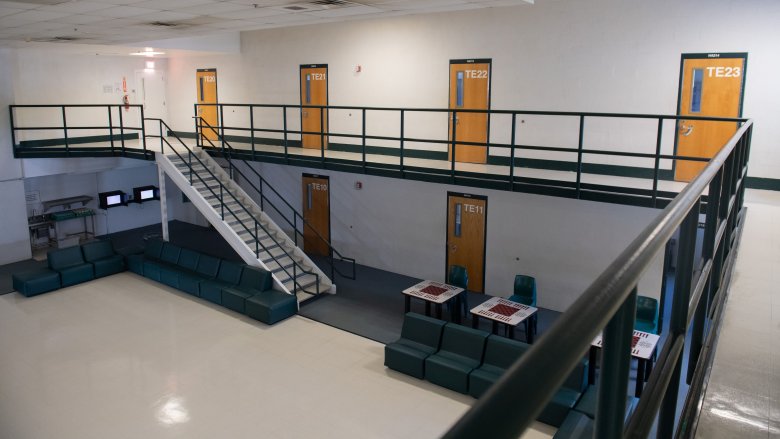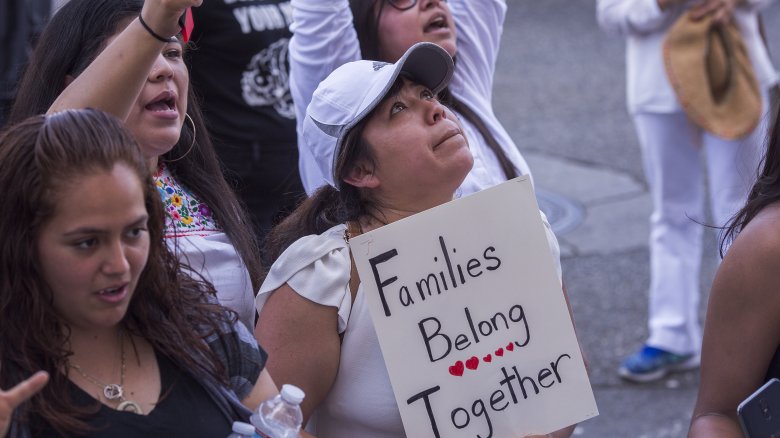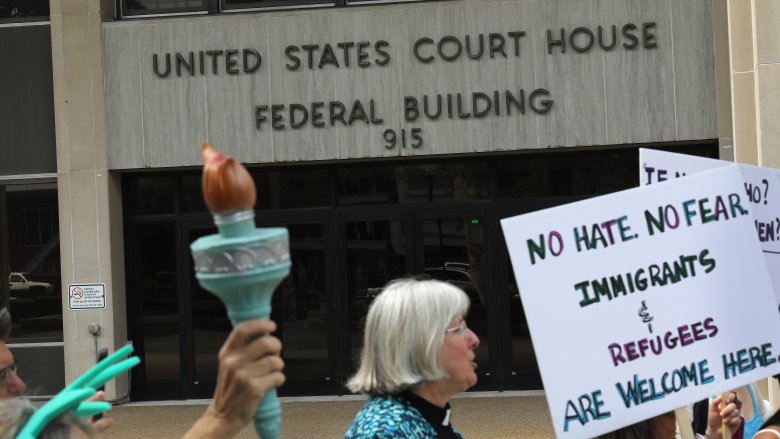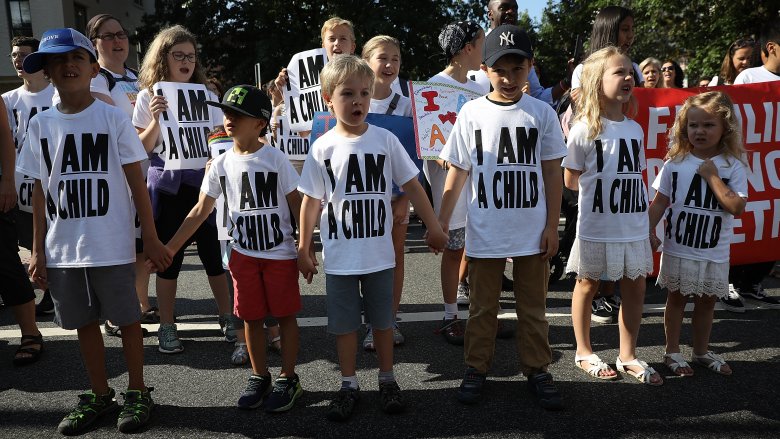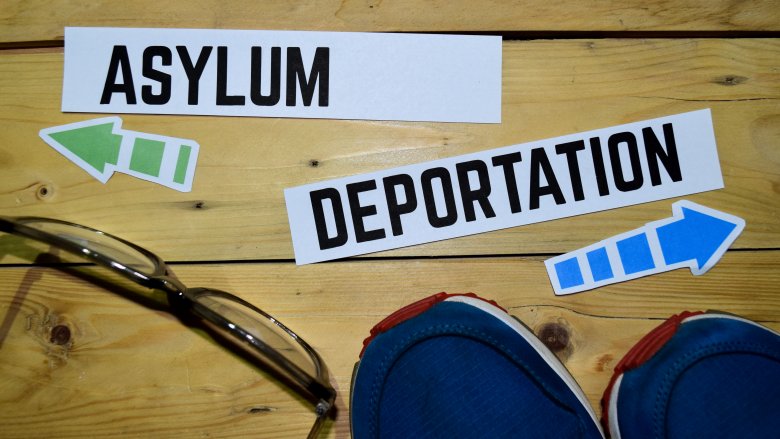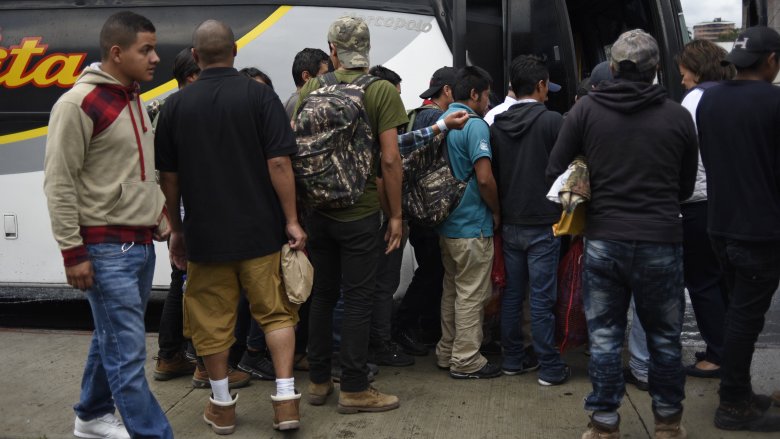What Really Happens To Immigrants At The U.S. Border
Immigration is an incredibly hot-button issue. In 2018, it hit the headlines in a big way, although Donald Trump made it an issue from the moment he announced his candidacy, saying Mexico was sending all these horrible criminals over the border, and maybe a couple good people. Chants about building a wall to keep people out have been a mainstay of his rallies for years now. And as of this writing, the government is actually shut down over an inability to agree on funding for that wall.
But for all the news coverage about the caravans coming up from Central America and the images of children being tear gassed, there is a lot of ignorance about what actually happens when immigrants get to the border. There is a difference between sneaking in and asking for asylum, as well as crossing legally and illegally. But it's all important to know. Here's what happens to immigrants at the U.S. border.
The long waits can encourage people to do things illegally
When you show up at a border crossing, you might find yourself waiting for days to get processed if you're lucky, and waiting for weeks if you aren't. And it's not like you can just pop to a hotel and chill until your name gets called. Migrants usually end up living in "makeshift camps," according to AZ Central. This means sleeping outdoors on thin mattresses with a blanket. In some locations there are volunteers who will bring stuff like crayons for the kids. There are coolers filled with water and juice.
The wait can be ridiculous. The AZ Central reporter found on one day only two men were let in and the next day just seven children were processed. Considering how many people are showing up, this is way too slow. It's not unusual for border agents to just suddenly say they are "full" and make the asylum seekers leave.
That leads a lot of people to cut in line, as it were. If you cross anywhere but a border station, you have entered illegally. But then you get taken into custody on this side, which is what many migrants are aiming for anyway. Anne Chandler, executive director of the Houston office of the nonprofit Tahirih Justice Center that helps immigrants, says people will show up at a legal crossing, hear how long the wait is, then cross illegally basically just yards away and go looking for a Border Patrol agent to be arrested. That way they get food and shelter quicker.
Illegal crossings aren't really the problem
While it's illegal crossings at the border that are all over the news, that's not actually where you need to be concentrating if you're worried about overall illegal immigration. Significantly more people become illegal every year because they overstayed their visas (student, business, temporary visitor, etc.) than because they snuck across the Mexican border, according to the New York Times. This also explains why a quarter of undocumented workers in the U.S. aren't even Hispanic.
Still, it's the border crossings everyone is fixated on. But the number is plummeting. USA Today says since a high of 1.64 million apprehensions in 2000, the amount of people caught crossing illegally was down 81.5 percent in 2017. Unless immigrants are getting astonishingly sneaky, it means it's becoming a lot less of a concern. And most of the people who cross are doing it for the first time. The number of people caught who had previously been deported is a very small amount of the total. What we have are first-timers, many asking for asylum from the dangers in their home country, and in much smaller numbers than we saw two decades ago.
And those rapists and murderers? Out of 11 million undocumented immigrants already here, only 2.7 percent have been convicted of a felony, making them more law-abiding than the native population. There is no reason to think those making the trip now don't have the same ethics, but the very few who don't are the ones who make the news.
Even if you do everything legally, you're still detained
If you want to enter this country at the border, you will probably end up in what is basically jail. It doesn't matter if you do it legally at a port of entry and are applying for asylum (all absolutely the "right way" to do things conservatives always talk about), according to Axios, you will "still likely spend time in detention." The San Diego Tribune adds that asylum cases can take years to resolve, and applicants can expect to spend most if not all that time in facilities run by private prison companies. And as you may have seen on the news, these detention centers are not fun places to be, full of cages and mattresses on the floor and foil blankets. And considering there have been legitimate reports of a "culture of abuse" against the migrants there resulting in every horrible thing you can think of against adults and children, you can see why people might want to avoid it.
As mentioned before, some immigrants have even been turned away at border stations, so their option of doing things legally is taken away from them. Often they then opt to enter illegally. While some obviously try to get in unseen, many seek out authorities specifically so they can start their asylum process. But USA Today says if illegal immigrants are caught within 100 miles of the U.S. border and have been in the country less than two weeks, they may face expedited removal and get kicked out really quickly.
What was up with family separation
One of the biggest stories of 2018 was the fact that families were being separated at the border for no reason except punishment, and many considered it cruel and completely unnecessary. The backlash got so bad that Trump eventually caved, which he hates doing.
Talking to Texas Monthly, the Children's Border Project found that 90 percent of children they saw were ripped away from their parents. They said this was happening even when the family were first-time asylum seekers. Despite Trump claiming this was the same policy Obama and Bush had, CNN proved it was decidedly not, and the CBP representative said they'd never seen it before.
Adding to the problem, the complicated legal system, horrific record keeping, and language barriers meant that when it came time to reunite families, some of the kids couldn't be found. Those who were had serious trauma from the separation. Even Ivanka Trump spoke out against it, and the zero-tolerance policy was changed by executive order in June 2018.
Mostly. CNN reported that in the six months after separation officially ended, 81 kids were still taken from their parents. In some cases, like the parent being hospitalized, it made sense. But the reasoning behind 25 percent of them was very unclear. And some kids are still lost in the system.
The court system is stacked against everyone trying to come in
After you cross the border, at a legal point or illegally, you end up in the court system. A Texas A&M law professor says there are 58 immigration courts and each judge sees about 1,000 cases a year. In 2016, about 70 percent of cases resulted in deportation.
That means if you aren't applying for asylum, your chances aren't great. Possibly because you don't automatically get a lawyer like in regular court, unless you can pay for one. So only 37 percent of defendants are represented. If you've been detained and charged with even the lowest-level offense you are often brought into court in shackles and a jumpsuit. This despite the fact that entering the U.S. illegally can carry just a $50 fine. If your case is turned down you can appeal, but only about 8 percent of appeals succeed.
Asylum cases, on the other hand, hinge on if an applicant has a "credible fear" of going home, according to the San Diego Tribune. If the Border Patrol agent who interviews you decides you have nothing to fear from all that gang violence or whatever you're fleeing, they start the process to send you back, although you can appeal. (Former Attorney General Jeff Sessions decided to make it more difficult for women fleeing sexual and physical abuse to get asylum, so the threshold of fear is high.) If your threat seems credible, you get a court date and start the long asylum process. But at any point you still might be deported.
Children's legal journeys are traumatizing and farcical
All that we've covered — that's just what the adults go through. Children have their own process. When the family separation policy was in place, within 72 hours of apprehension, kids were taken from the adults they were with and classed as "unaccompanied minors." (Many children also show up on their own from the beginning.) Houston Public Media says in either case they are sent to a temporary shelter while the government figures out what to do with them. In some cases, their parents will plead guilty and agree to leave the country just to get their kids back, so their ordeal is over quickly. Other times it takes longer, with the average wait being about a month, although that has apparently been increasing.
The best-case scenario at that point is the children are released to relatives already in the country. If that isn't possible, they would likely enter the foster care system. According to Texas Monthly, siblings are not necessarily kept together.
Children also have trials, regardless of if they are old enough to understand what is going on. NPR reported on a 1-year-old who went before an immigration judge on his own. Again, these kids aren't guaranteed lawyers unless they or someone else can pay for them. So toddlers are expected to explain sufficiently to a judge why they should be granted asylum, after they hold up fingers when asked their age. The government actually sends people to the detention centers to explain the legal process to the children beforehand, as if they can possibly grasp the complexities.
What happens if you actually become eligible for asylum
Time reports that the number of people applying for asylum has skyrocketed, led by more families and children arriving. You can only apply for asylum if you are already in the U.S. or at its border (unlike refugees, who apply from other countries) so traveling here is literally the first step of the process. But Trump has made it clear he thinks asylum seekers are just illegal immigrants by another name and has tried to make things harder for them. Of course, international law says we have a responsibility not to send people back to a place they could face serious harm or death, according to immigration attorney Mana Yegani. If you convince a judge of your "credible fear," you'll get a green card a year after your asylum is approved.
But Immigration Equality says as soon as asylum is granted, you are allowed to legally live and work in the U.S. You can apply for government benefits and not have it held against you when it comes to getting your green card. After five years in the country, and four years of holding a green card, anyone with asylum can apply for citizenship. You can also be forgiven doing things "incorrectly" — for example, if you crossed illegally it won't be an issue. However, it is not recommended that you ever travel back to your country of origin, since then the government can use that to prove you weren't really in danger and can revoke your legal status in the U.S.
What happens when you are deported
If you know you aren't going to get to stay, you can offer to leave the country voluntarily within the next two to four months, according to USA Today. However, there are many stipulations, including having valid documents and a decent amount of cash on you, which many people fleeing north don't have.
After a hearing, you might hear you are going to be deported right then or you might get the decision by mail. When it's a judge who says officially that you have to leave the country, you can appeal. Immigration cases have been appealed all the way to the Supreme Court in the past, and the legal wrangling can often take months even if it doesn't go that far. You might be detained during this process or possibly released on bond if you're lucky. But again, for about 70 percent of people, the final decision is going to be to send you back home.
There is a rule that deported people have to be sent back directly to their country of origin. This means if you're from Mexico you might literally be walked back across the border, or possibly bussed. But for other countries, flights are involved. There is a branch of Immigration and Customs Enforcement called Air Operations specifically tasked with handling those logistics. They run regular flights to Central American countries, as they so frequently have people to put on them. Flights to other countries are less frequent, but they will kick you out somehow.

